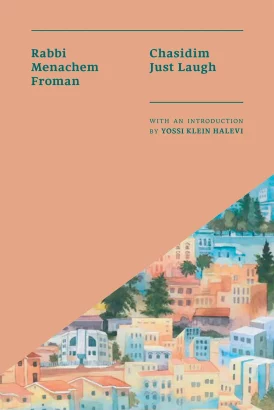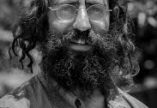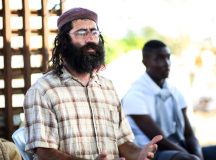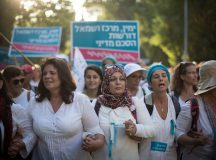It is with great awe and trepidation that I agreed to put on the page my reflections on the publishing of Chasidim Just Laugh. Just as our connection to G-d is inherently personal and therefore ineffable, Rav Menachem also reflects something of that, because his most refreshing quality was probably his absolute tenacity of belief and pursuing G-d. Many of my hours with him happened between 11pm – 1am learning Zohar, the foundational work of Kabbalistic literature. While that seems exotic and mystical, what stands out from that learning was being in the presence of a soul so dedicated and so given over to the process of learning Torah as a way of connecting to the the Divine.
One powerful memory I have of Rav Menachem is his Pathos – the pathos of belief, the pathos of practice. And with Rav Menachem, that pathos wasn’t restricted to the cubicle of study, but poured directly through the news, including the pain of friends struggling with loss. It included taking the weekly Torah class out to the street during the social justice protests during the summer 2011; to stop mid-sentence and turn to Jerusalem in order to pray for a students’ daughter who was suffering from illness; to close the book of Zohar at 1:00 am and plunge into a conversation about who could translate a letter to send to Turkey’s President Recep Tayyip Erdoğan, or to get a message to the President of the US – because peoples’ lives depended on it. Concepts such as Life-G-d-Peace-Unity-Marriage were all synonyms of a Holy Language for Rav Menachem. And being around him pulled you in. To life.
I came to Israel seeking a life where the mundane and profound could meet, where my Jewish heritage and story could converge in the one land our people can call home. To participate in the Zionist/Jewish project of creating a state and society that would not just provide our people refuge, but also open a gateway to the world of different nations and faiths. In that context, Rav Menachem was a deep blast of life. Hidden under the black suit and long beard was a living circuit of life, both devoted to the details of religious practice and the living story of the people of Israel, and riling at the constrictions and contradictions. Willing to make a mistake, to err on the chance of serving G-d; a pious man unafraid to apply Chasidut to politics, to bring Judaism to the main stage. What fearlessness! How I miss it.
I came to Rav Menachem as an immigrant and a baal tshuva, someone who returned to religious observance. In that context, let me share a few reflections from my perspective as an outside observer, or as Rav Menachem would term it ‘from the Tree of Knowledge’. The space that Rav Menachem opened for his students was a space for people to rebel and create. We lived in the desert of Tekoa, far from the spine of the Judean mountains on the edge of the desert – the place of prophecy. For those who grew up being dragged to demonstrations and bearing the load of powerful ideologues of the settlement movement, including the religious instruction of schools and yeshivas, Rav Menachem alluded that holiness could be sought out there, in that tantalising world of freedom – in the writings of Kafka, on the stage, in personal expression. And perhaps most importantly, holiness could be found in not having a prepared and ready answer to the real questions that life slaps us with – both personally and nationally. This crowd was deeply cynical – that’s what happens when one grows up burying friends for ideological dreams – be they the search for peace or Greater Israel. And the existential honesty, the depth of the questioning that powered Rav Menachem, stood strong. As he and I and his many students would often sing: ‘Life is garbage, life garbage – The Messiah must arrive!’
I remember a friend who married into the Froman family shared with me that when she met Rav Menachem she was deeply sceptical. ‘This is the Rabbi who meets with terrorists and talks about ‘peace with the Arabs?!? What a joke. But when I was in their house and heard him scream Shema Yisrael, I suddenly realised that I had no clue with whom I was dealing.’ That story touches on something, about the media-dominated world we live in that too often reduces people to social media posts, and depths to screens. Rav Menachem was hard to define. He didn’t have a driver’s licence. He didn’t create an organisation. He felt he had a job to do in staying true to chasing G-d, and when facing himself, I don’t think he had much tolerance for anything less than that. As a passenger in the car, he always had a holy book open. As an ‘activist,’ he did what was called for in the moment, according to what he clearly acknowledged was his own limited understanding of what could move the world forward. But his actions were with pathos, with volume, or sometimes with utter silence. And if he was wrong, he trusted in G-d to correct him later. As he liked to say in the name of our Muslim co-believers, Alla HuAkbar. G-d is more powerful than us.
One of my greatest frustrations as an immigrant to Israel, (which I hope this printing comes to assuage), is just how hidden Rav Menachem’s world of creativity-life-devotion-honesty-humour and community under the meta-title of ‘Jewish life in the Land of Israel’ remained from the Anglo-Jewish world. While much of the Jewish press and Jewish conversation is spent talking about things, there is a vitality of living them that Rav Menachem was dedicated to. The book succeeds in sharing that, and for that reason it’s a page turner. Not necessarily because of a developing narrative, but rather because of Rav Menachem’s devotion to being real, and sharing reflections in so many directions – about the beliefs we hold too tightly, about jokes and Yiddishkeit, about politics, and then the simple glimpses into family life.
That gap between the Israeli and diaspora experiences is examined across the Jewish community discussion boards as one of many divides within the Jewish people and this too is touched on in Rav Menachem’s teachings. The Kabbalistic work of seeking the secret unity between disparate entities was one of his life’s passions. Just as the Jewish people are deeply challenged by the question of how to advance and develop amidst our internal clashes of worldviews, so is the world at large. And those different ideological camps each hold within them aspects of truth, or in Rav Kook’s terms, sparks of holiness that are part of the greater human puzzle. Rav Menachem was a deep student and believer in the Jewish concept of machloket – disagreement – and was constantly studying and teaching the Zohar, the book he described as being perplexed by the question of the oneness in the world. Seeking the point where opposites encounter each other, where the two hands clap – as he would literally perform on stage and synagogue.
This determination not to fall into a sense of rightness and ideological blindness, but rather to recognise the greater processes playing out and to seek the change and development between the great tensions and inherent contradictions of life, was part of the sense of the secret of life that learning with Rav Menachem sometimes revealed. It’s a restlessness that pervades many of the teachings translated in the book. Here is one favourite, based on one of the core stories of the Torah – Adam and Eve eating from the tree in the Garden of Eden. It’s the 13th teaching in the book, and I’ll quote the opening.
‘What was Adam’s sin? According to the Zohar, his sin was not that he ate from the Tree of Knowledge, but rather that he didn’t first eat from the Tree of Life. He didn’t combine them.’
The Zohar understands that the opposing forces in this world complete each other. Each side of the machloket – be they progressive or conservative, collective or individualist, Israeli or Palestinian – is part of the story. Rav Menachem didn’t write off the parts of the world that didn’t fit in nicely. He saw the world and its conflicts as G-d’s revelation – to be processed and worked through, evil to be opposed and goodness to be raised.
He taught that only when we enter the machloket can the process of growth and change start taking place. This constant belief in change and the process that could be taking place if opposing sides would honestly engage with and not seek to erase and delegitimise the other side in the machloket, was a life’s work.
This meant that he could laugh at his Zionism with the anti-Zionist critique of some ultra-Orthodox on the one hand and shed a tear from great emotion while he prayed (not sang) the Hatikva. He could meet with leaders of Hamas (as beautifully described by Yossi Klein Halevi in his forward to the book), and bless his soldier-to-be students that they should eliminate terrorists.
Perhaps one of the clearest signs of Rav Menachem’s greatness was his humour. He never shied away from the most real challenges that he saw, would barely sleep and work at them with passion and pathos – and still be able to laugh at himself in the event that he may have been wrong. And then try again.
His mission was to work for the ‘Tree of Life’ in other words, to be in the game of life full force. And yet also to stop and think, reflect and learn.
Many ask today what Rav Menachem would have said or done after 7 October. I don’t know, but I know whatever he did would be with his utmost being – whether in silent mourning and consolation, or ferocious prayer, or praying for the success of our soldiers and in seeking peace. They would all be bound with a cry for life, a challenge to what our blindspots and a dedication to using the gift of life while we have it.
Before he passed away, during his struggle for life, he added the name ‘Chai Shalom’ to his given name Menachem Yeshoshua. He prayed for the chance to have more opportunities to live life and serve Peace [Peace is one of the names of God], which as he constantly reminded us, is one of the names of G-d, in this world of war and conflict. I just know he would be a living, stark reminder that we all have what to do, give and live for. Just writing these words keeps me up at night tonight, asking myself whether I am living life to the full, and reminding myself of the pathos this world deserves.



































